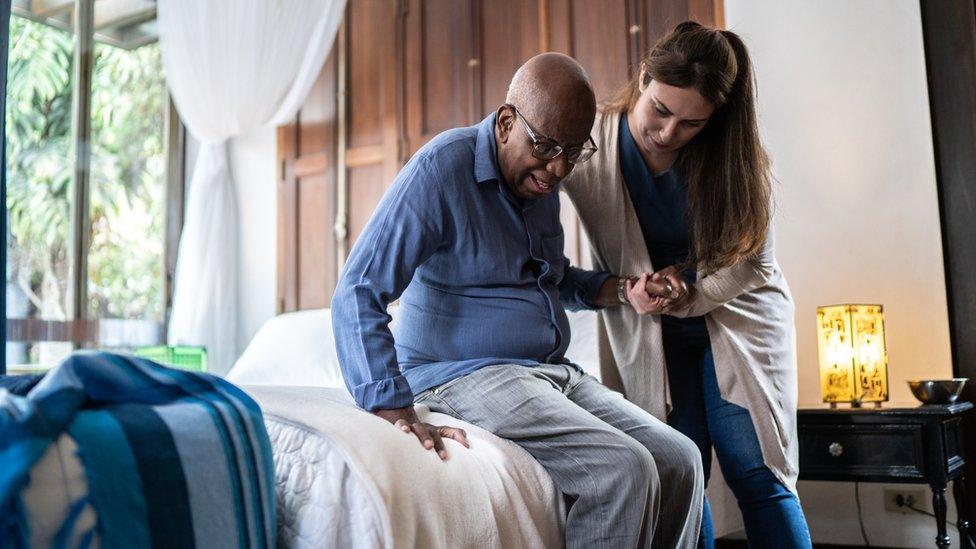'I was left with no hours, no wages - nothing'
- Published

After the main patient she looked after passed away on Christmas Day three years ago, care worker Sharon's working hours dropped immediately from 45 per week to zero.
"I was left with no hours, no wages - nothing at all," says Sharon, who has worked in the care sector in Morecambe for about 20 years.
She is one of about 3.9 million women in roles with unpredictable pay, no guarantee of set hours and little access to employment rights, according to new research.
Women in the UK are nearly twice as likely as men to be "trapped" in such severely insecure jobs, the Work Foundation has found.
The think tank, which seeks to improve working conditions in the UK, said it meant many women were now "at the sharp end of the cost of living crisis".
Sharon, who asked to remain anonymous, has worked on a zero-hours contract for years and says that "every single hour counts".
"I call my manager up each week, asking them for more hours," she says, with her working day mostly spent going house-to-house helping patients at home when they're discharged from hospital.
While she has built back up her hours to about 30 per week, she describes the uncertainty as "very stressful".
She also tries her best to save money to ensure she can cover her bills in case her hours drop again, although she "loves her job and her patients".
'Hand to mouth'
With prices rising rapidly, some of her colleagues are "living hand to mouth", she says, with one not able to afford the fuel to drive to appointments if pay cheques don't arrive on time.
Sharon adds that the zero-hours contract means that she feels a lack of control - where she is obliged to take work last minute and contacted on days off.
"If you say no once or twice, then they'll offer work to other people. You scratch their back, they scratch yours," she says, worried that saying no would affect her working hours in the future.
The Work Foundation research - which was shared exclusively with BBC News - is based on official labour market statistics.
It previously found that workers in hospitality, retail and agriculture were forced to work in insecure jobs more often, with limited access to basic rights such as sick pay or redundancy pay-outs.
Its new findings revealed that mothers generally took on more work on a temporary basis or on a zero-hours contract than men.
Those with children under nine were 2.7 times more likely than fathers to be working in a "severely insecure" role.
In addition, it found that black women and disabled women were more likely to have insecure jobs than their white or able-bodied colleagues.

In the UK, 15.6 million women aged 16 and over were in work between June and August this year - up 96,000 on the year before, according to the Office for National Statistics, external.
Although the proportion of women in the workforce has increased, Melanie Wilkes, director of research at the Work Foundation at Lancaster University, said: "It feels that too often women have to make trade-offs between access to flexible working practices and secure jobs.
"Set against the backdrop of the cost of living crisis, falling real wages and an impending recession, we're living in extremely challenging times for those in low paid, insecure jobs who are struggling to make ends meet."
The Work Foundation wants the government to improve access to affordable childcare and make flexible working available to all staff from day one.
It also urged politicians to commit to uprating universal credit payments in line with the cost of living from April - something the government has not yet committed to do.
Angela Rayner, Labour's deputy leader, said a standalone bill to improve employment rights was also yet to be introduced, despite being a Conservative manifesto promise.
She said Labour would ban zero-hours contracts, adding that workers had "been left paying the price for a Tory crisis made in Downing Street".
The Department for Work and Pensions, however, said it was helping low paid workers in a variety of ways, including with support for energy bills.
"As part of our £37bn support package, we are enabling people on universal credit to keep £1,000 more of what they earn and supporting vulnerable families in England through the Household Support Fund... to help pay for essentials," it said.
Related topics
- Published12 April 2019

- Published16 November 2021
